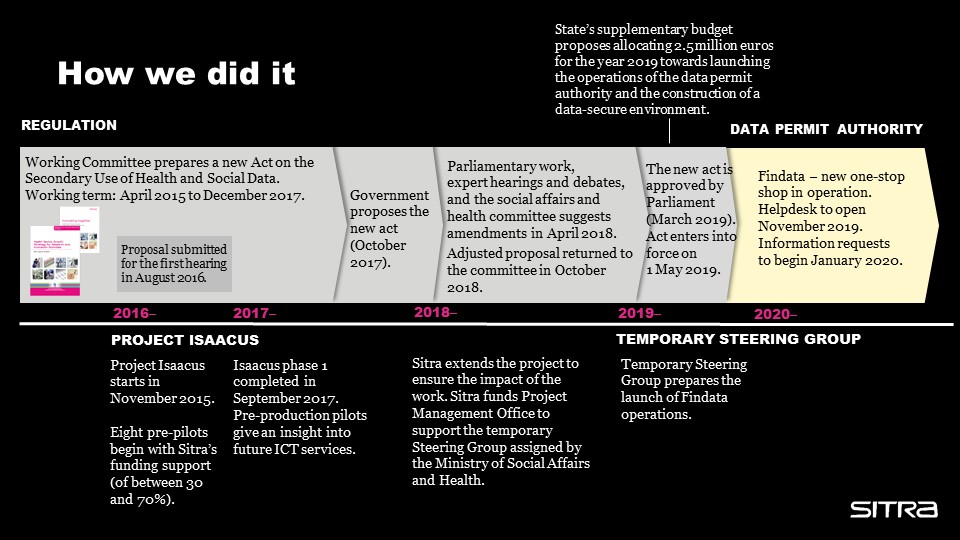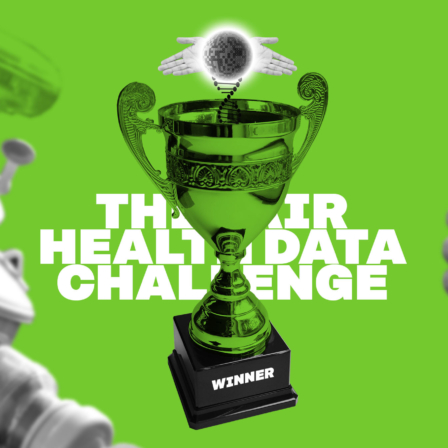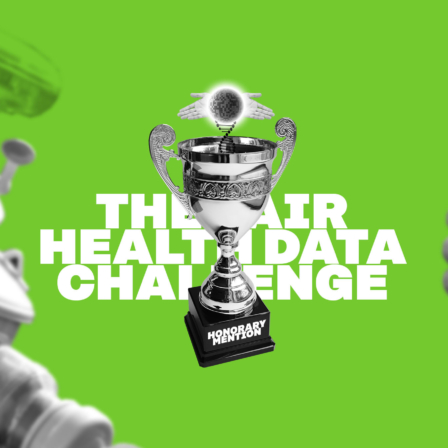The Finnish Parliament has approved the Act on the Secondary Use of Health and Social Data that entered into force on 1 May 2019 (the text of the act is available in Finnish, in Swedish and in English).
The new legislation provides new options for the use of data. Most importantly, it enables and expands the use of social and healthcare data from the traditional areas of research and statistics to those of management, development, innovation, education, planning, and steering and supervision work. It not only opens up the national social and healthcare registers, but also data from the operational client and patient systems in primary care, specialist healthcare and social services.
The new act widens the use of social and health data from research and statistics to management, development, innovation and education.
Decisions on using the data will be taken by a national centralised body, the new Data Permit Authority, and sensitive data will be handled in a safe and secure environment. Access to data is controlled and only the results of the analytics can be used externally; the data stays secure. The reform will speed up the permit-granting processes, unify decision procedures and develop Findata − a one-stop shop for data.
The new regulation implements the GDPR (the EU’s General Data Protection Regulation) in Finland. It is one of the first implementations of the GDPR for the secondary use of data in Europe.
Extensive collaboration in the preparation process speeds up the launch of Findata
The new act is a good example of governmental policies enabling legislation to promote digitisation and the development of ecosystems. Cross-sectoral co-operation between several ministries integrated it into the political decision-making process, which ensured support from the government and from across the political spectrum.
Two national strategies were essential to the preparation process: the Health-Sector Growth Strategy for Research and Innovation Activities and the Information to Support Well-being and Service Renewal: eHealth and eSocial Strategy 2020.
Unique co-operation between public authorities, companies and associations was key to success.
Experts from ministries, authorities, companies and associations from across the private and public sectors worked together to prepare the implementation simultaneously with the legislation process. It was a unique way of working and something carried out for the first time at the national level. The traditional preparation process follows the pattern of preparing the legislation first, having it passed by Parliament and then starting the implementation phase. The new way took a lot of courage, some risk-taking and a strong belief in the ability to succeed. The reward is worthwhile, as it will speed up development and innovation and reduce the length of the implementation phase.
Alongside the legislation work, Sitra has played an essential role in the Isaacus project (2015-2018) to pilot, test and develop service models and processes, metadata descriptions, data lakes and co-operation models with authorities and stakeholders. The basic principles and an operating plan for Findata were prepared.

The process was also international, with an active dialogue and an exchange of information and best practices between the Nordic countries, EU member states and several other countries. The exchange of experiences and ideas was crucial to the success of the work.
The work will continue to establish the operations of the data permit authority and the construction of a data-secure environment. The new data permit authority will operate directly under the Ministry of Social Affairs and Health and will be a separate legal entity functioning as part of the National Institute of Health and Welfare (THL). The steering group will prepare the launch of Findata’s operations.
Before Findata opens for information requests in January 2020, its director and staff will be recruited in August. The estimated opening time for the new Findata website is this summer and the official helpdesk will open in November.
The benefits are numerous – easier, faster access with one permit application
There are many benefits that come with the new legislation. Once the Findata service is up and running, retrieving combined health and social data from different sources will be easier and faster and possible with just one permit application, removing the need to approach each authority and data source separately.
Previously, obtaining the permits and data has taken as long as up to two or three years. The new legislation guarantees securing a permit within just three months. For exceptionally complex data requests that can cover several data registries, the data permit authority can extend the time it takes to obtain a permit by a maximum of three extra months. In addition, the data will be provided with little delay, no later than within 60 business days after the permit has been approved.
Other benefits that come with the new legislation include better product and service innovation opportunities, more extensive data and new areas of data application: in management, development, innovation, education, planning, and steering and supervision work. People will get better social and healthcare services and medication, and they will be assured of greater transparency and security of their personal data. It will also enable the development of personalised services.
#Isaacus

















Recommended
Have some more.